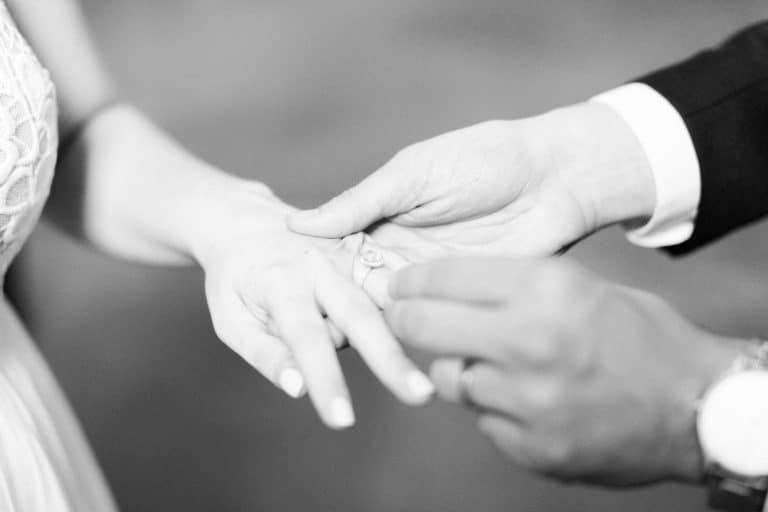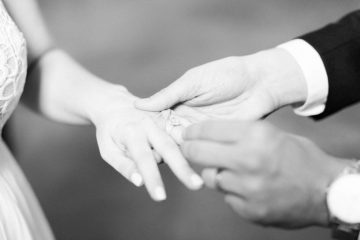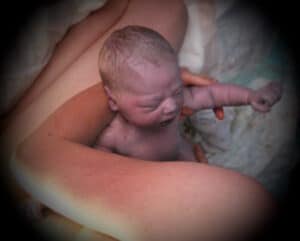I was married over a month ago. After months of debating whether or not to take my husband’s last name, I finally made a decision. During the process, I made a lot of discoveries and insights that made the process mean a whole lot more than just a means to an end.
So let’s talk about names. What’s in them? Why do we care so much? I was thinking a lot about this lately before and after the wedding day. Most people expect a woman to take her husband’s last name after marriage in the Western world. Culturally, that’s our norm! The thing about cultural norms though, is that they never apply to everyone. Being a standard or a norm doesn’t mean it’s “right” it just means it’s what many people are accustomed to as a society.
Yeah, so ultimately, I decided not to change my name. A lot of reasons went into this decision a couple of them being: I was worried about making a name change before leaving the country in August (what if there were passport complications?) and it’s just a hassle to change your name everywhere!
I asked Nick to summarize how he feels about my last name staying the same and he said was, “Ultimately it’s your decision as to how you identify yourself, no matter what your last name is I will still identify you as my wife. I just don’t have strong opinions about what your name is.”
In addition to interviewing Nick for this blog I also investigated how other women felt about changing their names. I used an instagram poll to collect some data and asked a group of Mormon women on a Facebook group to share their thoughts as well, both groups of data obviously have great biases, but this isn’t an experiment, just a thought exploration!
The most common reason woman said they would/did change their name to share with their husband was for the sense of family unity. I totally understand that. From a practical perspective, it’s so much easier to say “The Hainsworths” rather than “The Hainsworth-Ryans” or “The Ryan-Hainsworths” or “Ryansworths” or “who are you people?” (For the record, you can just call us Nick and Sam). For a lot of people, the idea of family unity centered on sharing a name with their children (again a desire I very much understand). I asked Nick how he felt about this too and he said, “Our kids will grow up knowing that we love them and we are part of who we are. They won’t even think that a last name isn’t the same as theirs. It won’t detract from you being their mother, it won’t even occur to them because they will just feel that we love them.” I loved Nick’s answer because it is totally true. My mom kept her maiden name although she and my dad have been married my whole life. I never felt less loved or less mothered or less unified as a family because she had a different last name. On the contrary, I felt more connected to her side of the family and I felt more like a Mertensmeyer than (I think) I would have felt otherwise.
A name pales in comparison to the unity created by blood, heritage, and most importantly, love! While, again, I understand why families want a sense of unity with names, to us, unity comes from somewhere else.
I didn’t choose to keep my last name to make a point or to be defiant, but I did do so because, to me, keeping your maiden name has always been “normal.” Of course, I wasn’t taught there was something wrong with taking your husband’s name, but it just wasn’t part of the little mini family culture I came out of. In the same way, we all come from different cultures with norms and biases of their own. Some of those norms and biases can be harmless, such as what your last name is, but sometimes they can form into prejudices.
Describing myself only as a white, Mormon, Michaels-worker (did y’all know? I’m working at Michaels this summer… hello employee discount) would be like describing Christ as a middle-eastern, Jewish, carpenter. It’s not inaccurate, but it doesn’t paint the picture. If someone asked you who Jesus Christ was, you probably wouldn’t start by mentioning his ethnicity, job, or even his religion. You would probably tell them about his heavenly mission, his forgiving heart, and the sacrifice he made for us. We are one in Christ because he suffered all, he knows all. But in the oneness Christ creates is diversity still. Not one of us were made the same, we were all made in unique images of our heavenly parents. It is through Christ that being one is even possible, but let me suggest that acknowledging difference and our unique creation is the first step to fully being one.
Christ lived and thrived outside his culturally normal sphere. Christ reached out to the poor, to the sick, the destitute, prostitutes, to tax-collectors, even to those who hated him. Christ begged forgiveness for those who crucified him. “Father, forgive them; for they know not what they do.” (KJV Luke 23:34) Christ did not live constrained to the cultural norms around him. He lived a law that transcended such cultural expectations, a law we should look to as well.
Cultural normativity can, but certainly doesn’t always!, become prejudice. Unfortunately, prejudice is alive and well. Elder Oaks, in his “Be One” talk acknowledged that following the revelation on the priesthood in 1978, members were not all able to suddenly adjust frames of mind and become completely prejudice free. Racism persisted then and it still persists today. Elder Oaks prompted us “to abandon attitudes of prejudice against any group of God’s children […] As servants of God who have the knowledge and responsibilities of His great plan of salvation, we should hasten to prepare our attitudes and our actions—institutionally and personally—to abandon all personal prejudices.”
Elder Oak’s is calling us to repent of personal prejudice and to move forward in Christ-like love. In that spirit, I urge us all to take a moment, think about a group of people you may have difficulty fully accepting. Know that prejudice isn’t always active, nor is it always hateful or willful at all. Prejudice comes from our cultural norms and the inherent difficulty in accepting deviations from that norm. So take a moment and first accept what is “normal” to you. Then take a moment and think about what might be difficult for you to accept. Perhaps understanding differing sexuality, or those who are transgender is difficult. Or maybe you have a hard time understanding why someone could possibly support an opposing political party. Maybe you jump to conclusions based on individual appearances. One last disclaimer before I actually let you have the moment I’ve promised—we all have difficulties with people in some way or another. You are not bad or wrong or sinful for acknowledging seeds of prejudice- we all have them. If we were perfect, we wouldn’t need Christ! Pray to understand what you don’t. Pray to love, as Christ loved. Ask forgiveness for your prejudices whatever they might be. Take this moment and think. (Then come back, I have more to say)
Did you find something? I know I did.
Ultimately, God doesn’t care WHAT our name is. I am a Ryan, I am a Hainsworth, I am an Ell, and a Mertensmeyer, and a Melies too. But, frankly, it doesn’t matter. He knows us individually and personally. He knows us by name, but I promise you that name will never change with Him. Names carry significance on many levels and they are certainly not unimportant. How you choose to name your children or how you change your name are personal choices and ultimately don’t affect anyone besides you (and in some cases your family). I urge all of my readers to have open minds and accept any naming tradition, whether it’s a matrilineal tradition, a patrilineal one, a hyphenated name, or none of the above. Shrug it off! Note the cultural diversity and embrace it. Find gratitude that other cultures exist besides your own!
S.J. Ryan is a convert, a feminist, a wife, and a child of God. She is still navigating the world of Mormon culture after converting during her junior year of college. She writes about her experiences as a feminist, Mormon convert at her blog, Small and Simple Things: samjoryan.wixsite.com/smallandsimplethings







7 Responses
In Italy, women don’t take their husbands’ surnames, which makes genealogy research super easy when researching matriarchal lines. Matriarchal lines are all but invisible here in the US, however, where women’s names are dropped at marriage. Hispanic research I found much easier, however, because Latina women not only keep their maiden name, but they append it to their child’s surname along with the father’s surname! So hispanic female ancestors typically keep both their mother’s surname and their father’s, as well (that is even better than the Italian matrilineal surname preservation).
We Americans have done a poor job of preserving female identity for historical purposes, I once pointed out on social media–but in doing so, I raised the ire of several LDS friends, who very loudly trolled me for sounding like a feminist in my post. Apparently, advocating for the preservation of female identity for genealogical purposes offends the conservative sensibilities of some Mormons. I find this hilariously ironic, considering we’ve been commanded to seek out, redeem, and preserve the identities of our kindred dead . . .
“I find this hilariously ironic”
Agreed.
I do like the Hispanic tradition, but as I understand it, the two last names ultimately come from the two grandfathers, so it’s still prettttty patriarchal.
Of course it’s up to every set of parents to name their children, but why do we ALWAYS assume (as implied in this post) that, in the US, if the parents have different last names, the kids will get their father’s?
I’m happily married, but in the process of legally changing my name back to my maiden name for many reasons. I’m so happy about my decision, but a bit terrified of my mother-in-law’s reaction when she finds out
Good for you. I changed my name because I wasn’t awake yet when I married. (Partly because my frontal lobe wasn’t fully developed. That takes a quarter century, apparently.) I don’t have any real regrets about it. I love being in a family with my new husband way more than I liked being in my old family. :/
But, one thing I want to add to this discussion is the question of why on earth do we automatically give our children their fathers’ names? Why do we not question this? Almost nowhere else in nature does a female’s offspring even know who his father is! And yet we take it for granted that a man has ownership and the power to use that ownership to leverage power over their mother.
Do you ever think about how so much of the Old Testament (e.g., Leviticus) is dedicated to making rules that ensure paternal knowledge of their offspring? It’s like the OT was written mostly to ensure power over women.
Why do we even give the most valuable thing we have, almost without even questioning it, over to men? I mean, my man is awesome. But, if he wasn’t, it sure would be nice to not have to give him equal access to the children that MY body made.
Just a thought. A little peripheral, but related.
“But, if he wasn’t, it sure would be nice to not have to give him equal access to the children that MY body made.”
That statement is not really about equality and equity between men and women. It is entirely about “women make babies so they should have all the power.”
Women do not make babies without men. It is part of the plan!. My children are biologically 50% my DNA.
If either parent is abusive, fails to parent correctly, etc. they should lose their rights. But until that point, no matter what either now thinks about the person they made a child with, surely they should have equal rights?
You are saying about being able to carry a baby what so often here is said about men and their holding the priesthood.
As I’ve stated on other Exponent platforms – whenever church people ask why I haven’t changed my name, I respond that Eliza R. Snow didn’t change her name and she was married to both JS and BY.